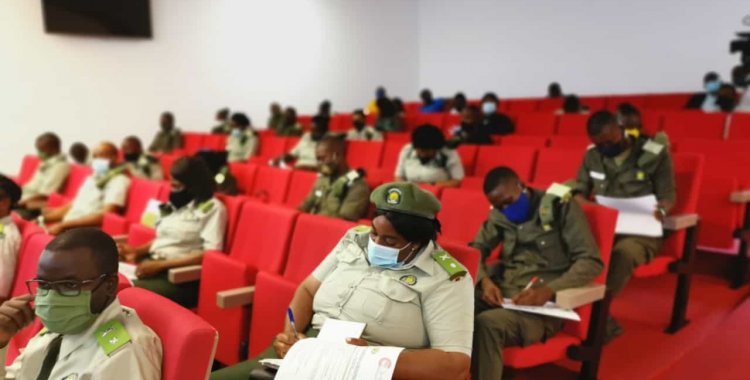The project, from the Center for Human Rights and Citizenship (CDHC), Faculty of Law of the Catholic University of Angola (FDUCAN), is called "Um Sorriso, Um Virtual Embraco - Virtual Parlatório", and has the financial support of the Program United Nations Development Fund (UNDP).
Speaking to Lusa agency, the CDHC director and project coordinator, Wilson de Almeida Adão, said that the idea came about for two reasons: the first, to mitigate the several months of distance between prisoners and families, due to the measures imposed by the Government to prevent and combat covid-19, and the second with the aim of accelerating the process of digital integration in the prison environment.
According to Wilson de Almeida Adão, 26,000 inmates have been out of contact with families since March, "which is a long time", which means that thousands of people, including households, are affected by this pandemic situation.
The official stressed that the creation of these rooms, initially eight in Luanda and the rest in the provinces of Namibe and Uíje, will also allow the possibility of trials, virtual hearings in the future, "which will add value, guarantee greater quality and reliability and , above all, reduce costs to the State ".
"The State spends a lot of money in this process of picking up prisoners. Imagine that a prisoner is a witness to a process and has to come to testify in Luanda, but he is in the Bentiaba jail, in Namibe, the State has to pay the ticket to come Luanda testifying and sending them back, that is, they are costs, which today with the use of new technologies are avoidable ", he said.
The official stressed that the lawyers' work "is made much easier" in matters with prisoners who are serving sentences or preventive detention in distant jails.
"Many of them [lawyers] have difficulties getting there and with these virtual rooms they will be able to make legal consultations or prepare hearings, in an 'e-learning' format, which reduces costs and ensures greater comfort and stability in the judicial system itself ", he stressed.
Asked how the new contact system between families and prisoners will work, taking into account the scarce resources that many people face, Wilson de Almeida Adão informed that rooms with Internet are being created in the integrated centers of social action, which are under domain of the Ministry of Social Action, Family and Promotion of Women and in the media libraries.
According to the project coordinator, this initiative will also help to create small businesses in the communities, based on the analysis of the costs for families traveling to visit prisoners.
"A lady or a father who will visit his son to a chain in São Paulo, Kaquila or Calomboloca, which are distant chains, he at least spends between 6000 to 7000 kwanzas only by taxi for that visit, but if he can rent in the neighborhood the Internet, with a phone - because it will be allowed by phone or computer - uses an Internet of 500 kwanzas, which gives 500 megs, it is very good to make a video call, that is, it reduces the cost ", he explained.
For the official, this type of initiative will end up creating business in the communities, just as there are now businesses in arranging phones, making phone calls, and the project can also encourage this type of micro business.
UNDP has already provided funding for the construction of the first ten virtual parliaments, which are scheduled to open in Luanda until December, with the first scheduled for November 24, starting with the female and male wings of the Viana prison.
The inauguration of virtual parliaments is planned for the next two years in the 44 penitentiary establishments in the country.
"Each parlor has an approximate cost of $ 20,000 to $ 30,000,000, of which $ 20,000 if the prison already has a room to do the assembly work and $ 30,000, as is happening now with everyone, who we had to build [ from scratch], because there is no space in the penitentiary establishments, so, this forced us to increase the cost by more or less US $ 10,000 in the construction of the rooms themselves, which was not initially planned ", he said.
In addition to the UNDP, the non-governmental organization Open Society, which will finance the construction and equipment of a room, also supports the project.







